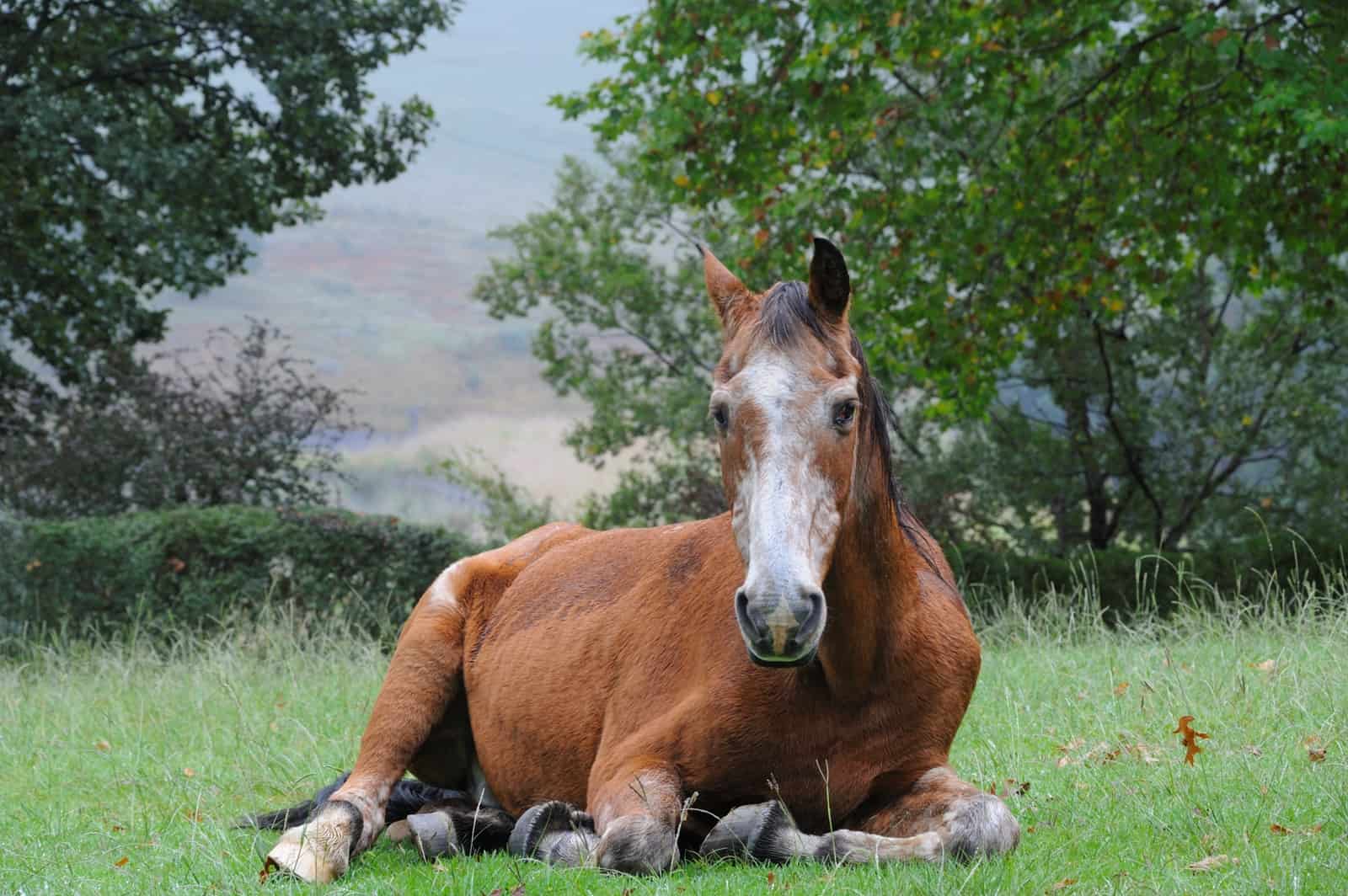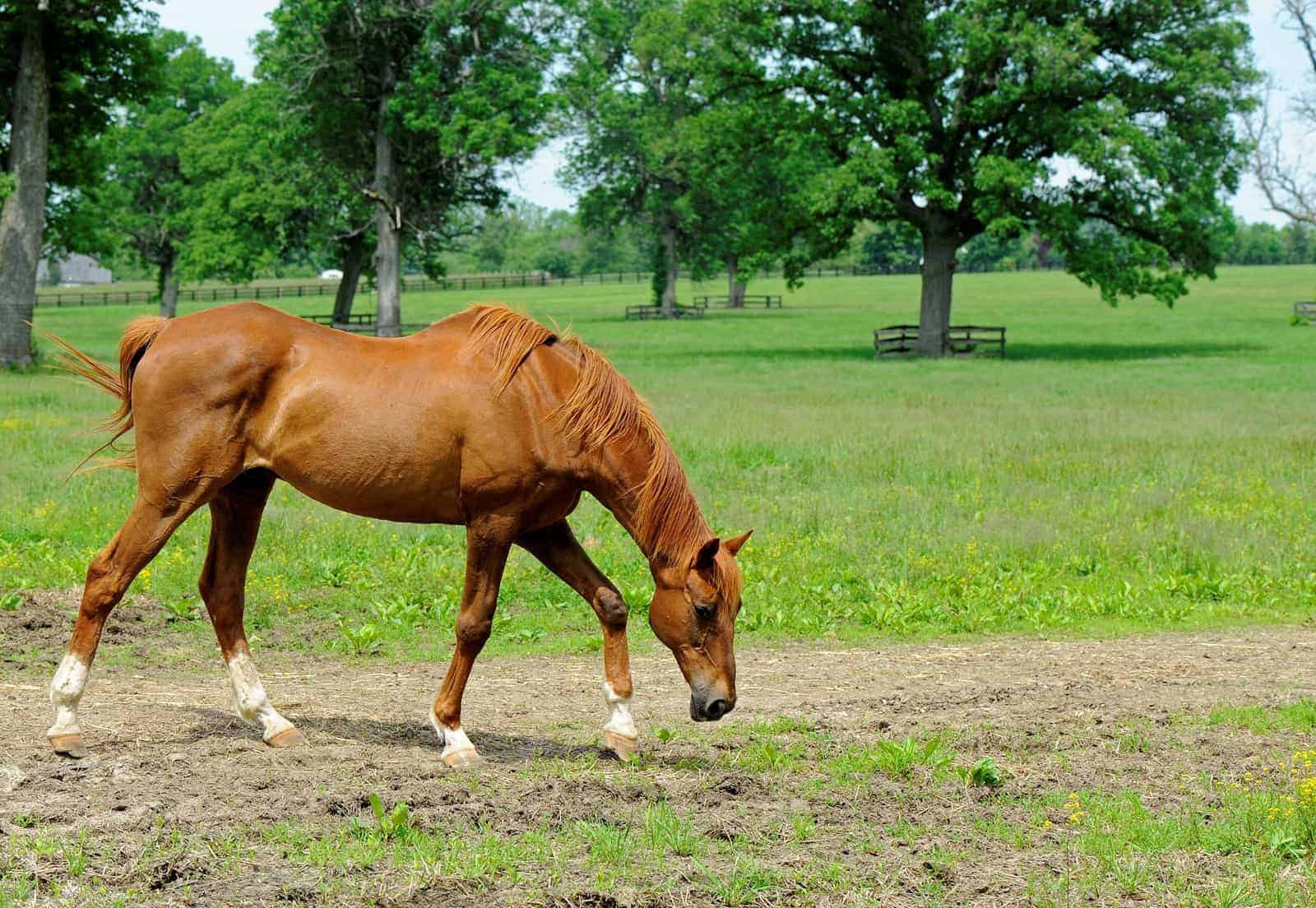Senior Horses: Living the Good Life

How to assess your senior horse’s quality of life and know when it’s time to let go
Owning senior horses is a blessing and a curse. You’ve enjoyed many years of partnership, built a strong bond, and share a mutual trust. On the other hand, you have to manage things like aging joints and worn-out teeth. There’s also that one pretty significant curse: Horses don’t live forever, and every owner knows he or she will eventually have to say that final goodbye.
Sometimes the horse makes the choice for us, going on his own, without prolonged suffering. Other times it’s a decision we’re forced to make—a severe colic or an irreparable injury that necessitates euthanasia. But in many cases owners must make decisions that aren’t black and white. When is it right to keep going, managing a few age-related health issues, and when is the most humane option to end his chronic pain and suffering?
We asked two veterinarians how owners can monitor their aging equids’ welfare and make end-of-life decisions.
Quality of Life: What Is It?
Quality of life is a complex and sometimes difficult-to-evaluate concept.
“For a good quality of life, horses should have adequate shelter, food, water, be treated with kindness, and be free of pain and disease,” says Janice E. Kritchevsky, VMD, MS, a professor of large animal internal medicine at the Purdue University College of Veterinary Medicine, in West Lafayette, Indiana. “Because horses are herd animals, they should have companionship. A horse all by itself could probably check most of the welfare boxes, but I’m not sure you could ever say a single herd animal is happy.”
Liz Arbittier, VMD, an assistant professor of clinical equine field service at the University of Pennsylvania School of Veterinary Medicine’s New Bolton Center, in Kennett Square, cites the American Association of Equine Practitioners’ guidelines to help determine whether a horse still has a decent quality of life. A horse should not have to:
- Endure continuous or unmanageable pain from a condition that is chronic and incurable;
- Endure a medical or surgical condition that has a hopeless chance of survival;
- Remain alive if it has an unmanageable medical condition that renders it a hazard to itself or its handlers; or
- Receive continuous analgesic medication for the relief of pain for the rest of its life.
“However, look at the last point, and then think about all of the horses out there that happily live on a gram of Bute (the non-steroidal anti-inflammatory drug phenylbutazone) for years with no adverse effects,” she says. “While they certainly can have problems related to chronic NSAID use (e.g., gastric ulcers, kidney issues)—and this step should not be taken without consulting your veterinarian—so many horses live comfortable and happy lives with some medical assistance. If the horse requires an excessive dose of NSAIDs to live a comfortable retired life, that may be a different story.”
Like everything with horses, it comes down to each situation, which is why it’s important to work with a team to ensure seniors remain healthy as they age.
“On the most basic level,” Kritchevsky says, a horse with a good quality of life “should interact with the owner, other people, and horses. They should move out, at least at a walk, willingly and have a good appetite. Finally, they should not have a chronic disease condition such as equine asthma, lameness, or (gastrointestinal) upset that cannot be managed. If these are present, one can assume that the quality of life is diminished.”
Causes of Decreasing Quality of Life
“Old age isn’t a disease,” Kritchevsky says. “Horses, like people, are very individual, and some horses are ‘old’ at 17 while others are ‘young’ at 27.”
So age alone doesn’t diminish a horse’s quality of life. Here’s more on the various disease processes that do.
Lameness and musculoskeletal issues
Arbittier says that in her practice, chronic lameness stemming from osteoarthritis and other musculoskeletal conditions is the most common cause of poor quality of life in senior horses.
While a hitch in the gait or slow, creaky, unsound steps around the field might seem like normal consequences of aging, don’t ignore them.
“Horses with arthritis or other lameness are in pain,” Kritchevsky says. “Owners have to be very sensitive to changes in severity of lameness.”
Again, veterinarians and owners can manage some horses with judicious NSAID or other medication use, but don’t rely solely on drugs to keep an unsound senior horse going. Work with your vet to determine if your horse is a candidate for treatment or whether his lameness issues are progressing to the point that therapy will prove ineffective.
Laminitis
Another issue that leads to lameness and can significantly impact a horse’s quality of life is laminitis—inflammation and damage to the laminae, the tissues that suspend the coffin bone within the hoof capsule. In severe cases the laminae pull apart, releasing the coffin bone to rotate downward or sink. A variety of scenarios can cause laminitis, but all forms are very painful.
Owners, vets, and farriers can work together to manage laminitis in many cases, but some severe bouts and their residual effects prove too unrelenting to treat effectively. At that point, euthanasia becomes the most humane option.
Pituitary pars intermedia dysfunction (PPID)
While it’s not unique to seniors, PPID is common in aging equids and affects more than 20% of horses 15 and older. In affected horses an enlargement of part of the pituitary gland causes the organ to release excess hormones that upset metabolic balance. The condition advances with age and, while veterinarians can prescribe medications to control the clinical signs, it has no cure.
Signs of PPID include a long, shaggy coat that doesn’t shed, chronic infections, hoof abscesses, increased water intake and urination, and muscle loss. Affected horses are also prone to laminitis and have weakened immune systems, which can compound to reduce quality of life.

Decreased body condition
Whether due to dental issues, metabolic disease, or other problems, seniors can have difficulty maintaining proper weight. This, in turn, can negatively impact not only their quality of life but also their owners’.
“Some horses can be managed but require being fed several to many times per day a very specific diet, sometimes with multiple components,” Arbittier says. “Their management becomes impossible for either the boarding facility or the owners, and euthanasia becomes the kindest answer.
“I have one client with a PPID horse in his 30s who has been a chronic laminitis case, and she feeds him a specific diet eight times per day as he can’t eat hay,” she adds. “I know very few people who could manage this schedule, but she is able to, and he is far past what we thought his ‘expiration date’ would be.”
‘But My Horse Has a Great Life …’
You’re aware of the potential issues. You know to watch for subtle changes in your horse’s body and attitude that might suggest a problem—for example, gradual weight loss, taking all day to consume food he used to clean up quickly, and not getting around as well as before. You’ll know when his quality of life is such that it’s time to make the call, right?
As much as we hope that last point is true, our sources say it’s easy for owners to become blind to deteriorating condition.
“This does not come from a place of malice, and even veterinarians suffer from this with their own horses on occasion,” Arbittier says. “Any relationship with an animal that you see every day and with whom you have a strong emotional connection sets you up to become inured to their quality of life.
“If you have a lame horse, you may be so used to seeing it limp, you forget that it isn’t normal for a horse to be severely lame at a walk in the field,” she adds. “If you have a horse that’s a difficult keeper due to some medical condition, you may be so used to encouraging it to eat that you don’t recognize that it’s been a body condition score of 1 or 2 for four months. If your horse suffers from chronic laminitis, you may reason away that it’s normal for a horse to lie down 80% of the day.”
If you’re unsure whether certain behaviors are normal, get input from a trusted source. “Ask a neutral third party—someone who knows horses but isn’t attached to that particular animal—to give their opinion about the animal’s quality of life,” Kritchevsky says. “Sometimes things that an owner doesn’t see, or doesn’t want to see, are obvious to someone else.”
Dr. Liz Arbittier
Arbittier says veterinarians are an owner’s best resource for identifying deviations from normal. She and Kritchevsky both encourage owners to schedule wellness and dental exams for their horses at least twice a year.
“A physical exam and a good conversation about the animal’s status are critical to keeping you focused on the important issues and realistic about your path,” Arbittier says.
Kritchevsky also recommends owners take photographs—from each side and the front and back of the horse—every six months. “It helps to see changes such as gradual weight loss or changes in hair coat” that you might miss when you’re seeing the horse daily, she says.
If you’re waiting for your horse to “make the choice” for you, it’s time to rethink your approach.
“This is a very slippery slope,” says Arbittier. “If your horse has a good quality of life, there’s no reason not to continue on as you are until something changes or the horse has a bad emergency.”
However, she says, if a horse’s quality of life is questionable, waiting for a major medical event or for him to go down and be unable to get up is unfair.
“I’ve rarely felt that a client was euthanizing too soon, but I have absolutely been confronted with suffering horses whose owners cannot make the decision to euthanize, even though it represents cruelty to the horse,” she adds. “We owe it to our animals not to let them cross the line into cruelty because we can’t bear to lose them.”
Watch Closely, But Don’t Panic
Keep close watch on your senior horses and note when things start to change, but remember that not all shifts spell the end.
“It’s fine for horses to change as they age,” Arbittier says. “You wouldn’t expect your 90-year-old grandfather to go running across a yard. It’s normal for them to slow down, lose their place in the herd (if they’re not being bullied), and spend a lot of time sleeping (while standing). These are totally normal signs of aging.”
She suggests owners ask themselves:
- Is the horse maintaining an appropriate body condition?
- Are his teeth in good shape or, if he’s lost teeth, are you able to manage his dental care and feeding needs?
- Is he reasonably sound at the walk?
- Does the veterinarian have to see him frequently for emergencies?
“If any of these answers are questionable, it’s time to ask your vet to discuss your animal’s quality of life and see if anything can be done to manage what isn’t working,” she says.
Kritchevsky adds that what’s difficult for an owner is balancing knowing your horse better than anybody else with the outsider’s perspective to be objective about his condition.
Finally, Arbittier says, “Involve your veterinarian to help ‘keep you honest’ about the condition of your horse. We all need these reality checks, whether we are longtime or novice horse owners.”

Written by:
Erica Larson
Related Articles
Stay on top of the most recent Horse Health news with















